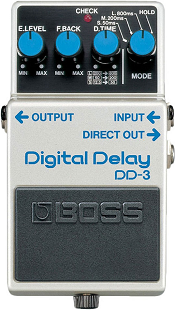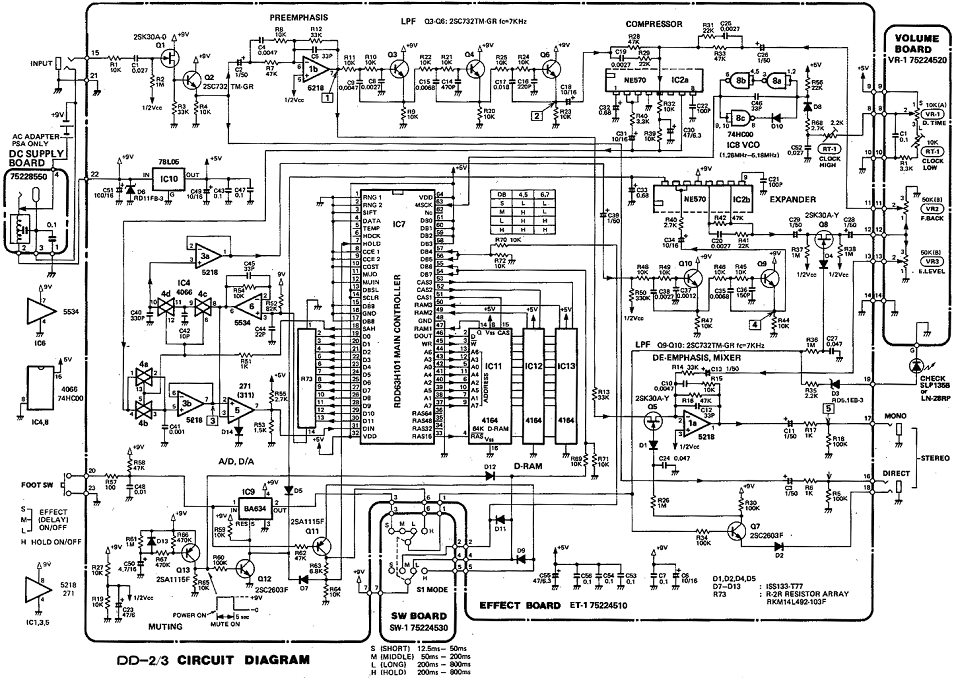Difference between revisions of "DD-3"
m (→Controls) |
m |
||
| (15 intermediate revisions by the same user not shown) | |||
| Line 9: | Line 9: | ||
* DD-7 | * DD-7 | ||
* DD-8 | * DD-8 | ||
| + | |||
| + | We originally got our first DD-3 in the 1980s when it first came out. We then obtained another sometime in the mid-1990s only to give one of these two away around 2008 to a work colleague. Anyway, we still have an original (older Made-in-Japan) DD-3 which means we have the original "sound". | ||
| + | |||
| + | |||
| + | ; Thermionic Studios has one(1) DD-3 available for rental. | ||
==Controls== | ==Controls== | ||
| − | [[File:Boss_DD3_front.png|right|frame]] | + | [[File:Boss_DD3_front.png|right|frame|<div style="text-align:right">Image from [https://www.boss.info/us/products/dd-3/ Boss' website]</div>]] |
| − | * Knob 1 - | + | |
| − | * Knob 2 - Feedback | + | * Knob 1 - "'''E. Level'''": (Effect Level) Turning clockwise, this knob increases the amount of effect (wet) signal. Dry signal always comes through at 100%. |
| − | * Knob 3 - | + | * Knob 2 - "'''F. Back'''": (Feedback) Fully counter-clockwise, this knob sets the delay for one repeats with additional repeats as knob is turned clockwise. Fully clockwise causes an infinite cascade of slowly degrading sound. |
| − | * Knob 4 - | + | * Knob 3 - "'''D. Time'''": (Delay Time) Sets the delay time, based on the "Mode" selector. Fully counter-clockwise is the minimum time window, while fully clockwise is the maximum time. |
| − | ** | + | * Knob 4 - "'''Mode'''": Most important control. This is a multi-switch to select between different delay time windows: |
| − | ** | + | ** 50 ms - varies from 1 millisecond to 50 milliseconds |
| − | ** | + | ** 200 ms - varies from 51 milliseconds to 200 milliseconds |
| − | ** | + | ** 800 ms - varies from 201 milliseconds to 800 milliseconds |
| − | * Footswitch 1 - | + | ** "Hold" - Based on the knob 3, "D.Time" setting, this setting captures the latest time segment in the delay and repeats a drone or set of notes for as long as the pedal is held down. |
| − | + | * Footswitch 1 - "'''On/Off'''": Toggles the effect On and Off | |
| + | |||
| + | ==Bypass:Buffered== | ||
| + | Like all Boss pedals, the DD-3 has a buffered bypass. | ||
==General Information== | ==General Information== | ||
| Line 27: | Line 35: | ||
==Pedal Manual== | ==Pedal Manual== | ||
| + | * [[Media:Boss_DD-3_OwnersManual.pdf|Boss DD-3 Digital Delay Owner's Manual]] | ||
| + | ==Phase Inversion: Unknown== | ||
| + | Candidly, this schematic is a bit more than we're able to work through and determine whether this pedal inverts phase or not. Right now, we're taking it as an article of faith that it doesn't invert phase based on our own past experiences, but memories are notoriously inaccurate. | ||
| − | + | Without going through the schematic and understanding how phase is changed inside the pedal, the only current method is to put the pedal on an oscilloscope and see if there is a difference in phase between the bypassed signal, and the effected signal. | |
| − | |||
==Schematic== | ==Schematic== | ||
| + | [[File:Boss_DD-3Schematic.png|center|frame|<div style="text-align:right">Assumed Public Domain, unaware of any Copyright claims</div>]] | ||
==Artists== | ==Artists== | ||
<div style="column-count:3;-moz-column-count:3;-webkit-column-count:3"> | <div style="column-count:3;-moz-column-count:3;-webkit-column-count:3"> | ||
| − | * [[ | + | * [[Nuno Bettencourt]] |
| − | * [[ | + | * [[Miki Berenyi]] |
* [[Joe Bonamassa]] | * [[Joe Bonamassa]] | ||
| + | * [[Billy Duffy]] | ||
* [[Paul Gilbert]] | * [[Paul Gilbert]] | ||
| + | * [[Dave Grohl]] | ||
* [[Yngwie Malmsteen]] | * [[Yngwie Malmsteen]] | ||
| − | * [[ | + | * [[Tom Morello]] |
| + | * [[Dave Navarro]] | ||
* [[Les Paul]] | * [[Les Paul]] | ||
* [[Michael Schenker]] | * [[Michael Schenker]] | ||
| − | * [[ | + | * [[Slash]] |
</div> | </div> | ||
| Line 53: | Line 67: | ||
# http://stinkfoot.se/archives/516 | # http://stinkfoot.se/archives/516 | ||
# http://equipboard.com/items/boss-dd-3-digital-delay | # http://equipboard.com/items/boss-dd-3-digital-delay | ||
| + | # https://www.hobby-hour.com/electronics/s/dd2-delay.php | ||
Latest revision as of 08:54, 19 November 2020
Boss DD-3 Digital Delay pedal (Japanese Manufacture).
Subsequent Boss Digital Delay models include:
- DD-5
- DD-6
- DD-7
- DD-8
We originally got our first DD-3 in the 1980s when it first came out. We then obtained another sometime in the mid-1990s only to give one of these two away around 2008 to a work colleague. Anyway, we still have an original (older Made-in-Japan) DD-3 which means we have the original "sound".
- Thermionic Studios has one(1) DD-3 available for rental.
Controls

- Knob 1 - "E. Level": (Effect Level) Turning clockwise, this knob increases the amount of effect (wet) signal. Dry signal always comes through at 100%.
- Knob 2 - "F. Back": (Feedback) Fully counter-clockwise, this knob sets the delay for one repeats with additional repeats as knob is turned clockwise. Fully clockwise causes an infinite cascade of slowly degrading sound.
- Knob 3 - "D. Time": (Delay Time) Sets the delay time, based on the "Mode" selector. Fully counter-clockwise is the minimum time window, while fully clockwise is the maximum time.
- Knob 4 - "Mode": Most important control. This is a multi-switch to select between different delay time windows:
- 50 ms - varies from 1 millisecond to 50 milliseconds
- 200 ms - varies from 51 milliseconds to 200 milliseconds
- 800 ms - varies from 201 milliseconds to 800 milliseconds
- "Hold" - Based on the knob 3, "D.Time" setting, this setting captures the latest time segment in the delay and repeats a drone or set of notes for as long as the pedal is held down.
- Footswitch 1 - "On/Off": Toggles the effect On and Off
Bypass:Buffered
Like all Boss pedals, the DD-3 has a buffered bypass.
General Information
Pedal Manual
Phase Inversion: Unknown
Candidly, this schematic is a bit more than we're able to work through and determine whether this pedal inverts phase or not. Right now, we're taking it as an article of faith that it doesn't invert phase based on our own past experiences, but memories are notoriously inaccurate.
Without going through the schematic and understanding how phase is changed inside the pedal, the only current method is to put the pedal on an oscilloscope and see if there is a difference in phase between the bypassed signal, and the effected signal.
Schematic
Artists
- Additional Sources
